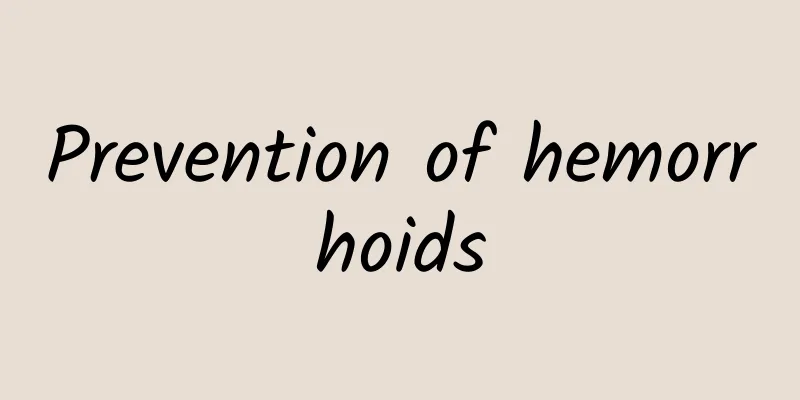Prevention of hemorrhoids

|
1. How to prevent hemorrhoids in daily life (1) Go to the toilet correctly. Reduce the time spent in the toilet. Many people have bad habits when going to the toilet. They think that going to the toilet is a time to relax. They use their mobile phones to watch videos, or browse some information. They sit for half an hour or even an hour. This is a very wrong practice. You must concentrate on going to the toilet and make quick decisions. Do not bring your mobile phone into the toilet to reduce the time spent in the toilet. It can prevent hemorrhoids. It only takes 5 to 10 minutes to defecate each time. Never exceed 10 minutes. Learn the correct way to wipe your butt. Change from rubbing hard or even picking to gently rubbing. Use toilet paper to dip it first, and then gently wipe it from front to back. Use a piece of soft paper to slowly rub it together. This can push the hemorrhoids back. Pay attention to hygiene after defecation. If you simply wipe it, there will be a lot of fecal juice or residue left in it, which will cause some inflammatory stimulation around the anus. Over time, it will cause infection and hemorrhoids. Wash the anus with some warm water. In addition, warm water sitting bath is also a good method. (2) Eat right. In fact, the occurrence of hemorrhoids is closely related to diet. If you particularly like spicy food, like to drink alcohol, or don't like to eat some fruits and vegetables, these are very important inducing factors. Some people eat very little to lose weight, and their food intake is very small. They may also have a small amount of stool, which can also induce hemorrhoids. So eat three meals a day well, match coarse and fine food, meat and vegetables, and eat more fruits, vegetables and other foods rich in dietary fiber. Don't eat spicy food, don't drink alcohol, which is a very important factor in inducing hemorrhoids. After drinking, the mucosa is congested, and the hemorrhoid area is prone to blood. It is easy to have a sudden change of hemorrhoids, blood in the stool and even swelling. Drinking beer is not good either. All alcohol preparations, including red wine, white wine, and beer, have a lot of stimulating effects on hemorrhoids. Don't get drunk if you have to drink. Some people drink too much and get drunk, and the hemorrhoids fall out without being put back. As a result, acute incarceration occurs, and emergency surgery may be required. (3) Exercise correctly. Avoid sitting for long periods of time. Sitting for long periods of time will cause continuous high-intensity pressure on the anus. Pressure around the anus will cause blood circulation to be blocked, which can induce constipation. Avoid inappropriate exercise, such as weightlifting, mountain climbing, or riding a bicycle for a long time. Do more anus-lifting exercises. How to do anus-lifting exercises can only be understood but not explained. Do one set in the morning and one set in the afternoon. Generally, lift the anus several dozen times. Two sets will strengthen the sphincter function, so that hemorrhoids are not easy to fall out and hemorrhoids are not easy to get worse. (4) Regular bowel movements. Having a bowel movement at this time every day is like an alarm clock, forming a conditioned reflex that prevents constipation and, therefore, hemorrhoids. (5) Avoid staying up late. Staying up late is a very bad factor for hemorrhoids and constipation. (6) Drink water properly. Drink more water. (3) Causes of hemorrhoids. 1. Why are people very prone to hemorrhoids? From the perspective of evolution, humans evolved from apes. At first, we lay on the ground, and later we walked upright. Due to the effect of gravity, the anal pad will move downward, thicken and hypertrophy, and the stool will be dry and bleed. After bleeding, it will prolapse. Therefore, blood in the stool, prolapse, pain, and itching are the most common causes of hemorrhoids. This is related to the structure of humans. Domestic cats and dogs will not get hemorrhoids. This is the price we pay for walking upright. Sitting for a long time, not paying attention to diet, drinking alcohol and eating spicy food can all induce hemorrhoids. 2. Will you get hemorrhoids after eating chili peppers? This statement is wrong. The spiciness that can easily lead to hemorrhoids, eating a lot of chili peppers, eating spicy food every day, and eating a lot for many years does not mean that you will get hemorrhoids after eating chili peppers. For example, in some vast southwest and northwest regions of my country, people generally like to eat chili peppers, while in the southeast region, people rarely like spicy food. There is no obvious difference in the incidence of hemorrhoids in these two regions. Why is this? Some people who eat a lot of spicy food in some spicy places may be more tolerant to chili peppers, while some people who eat less may not easily get hemorrhoids even if they eat less for a long time. Therefore, hemorrhoids and chili peppers themselves have some inducing factors, but it is not an equal relationship. It is wrong to get hemorrhoids after eating chili peppers once. If you can't eat chili peppers, you will easily get hemorrhoids if you eat too much chili peppers. If you have eaten chili peppers since childhood and are more tolerant to chili peppers, you will not get hemorrhoids 100% of the time, but you can't eat chili peppers in large quantities. 3. Increased abdominal pressure and straining during bowel movements can cause hemorrhoids ① In fact, this makes sense, and if you use too much force, it may even cause anal fissures, which are very painful. ②The onset of hemorrhoids is closely related to defecation. What we advocate is to let nature take its course. When the bowel movement comes, go and defecate and relax to let it go. ③If you are afraid that you will not be able to defecate, pushing too hard may backfire, because defecation is a very natural phenomenon. When you exert force on your abdomen, you must relax the sphincter. ④ If the sphincter is not relaxed, you will not be able to defecate even if you push too hard. Straining to defecate will increase abdominal pressure, and combined with constipation, it may aggravate or induce hemorrhoids, so do not push too hard when defecating. 4. There are several factors that induce hemorrhoids. The first one is related to constipation. If you are constipated, you are prone to blood in your stool. Another one is related to drinking alcohol and eating spicy food. You must pay attention to your diet. The third one is related to sitting for a long time and staying up late. Many people sit all day long, sometimes staying up late for a long time, plus eating spicy food, smoking, and drinking, it is easy to get hemorrhoids. 2. Hemorrhoids and other diseases 1. Hemorrhoids and colorectal cancer (1) What are the consequences of mistaking rectal cancer for hemorrhoids? There was a case. The patient died after about two years. The patient had blood in the stool. PPH was done on the hemorrhoids. A circle was inserted on the hemorrhoids, and a stapler was placed there. The doctor found a cancer inside. After the operation, it was found that there was no clear diagnosis before the operation. The hemorrhoids were used for surgery. This rectal cancer also had to be operated on. During the operation, there must be a wound. Some cancer cells fell off on the wound, which made it easy to grow again and spread and metastasize. After the stapler was inserted, the mucosa was missing a small piece. It was very difficult to perform anal preservation surgery. The patient relapsed after about a year, and then underwent radiotherapy and chemotherapy. I did hemorrhoid surgery without finding rectal cancer. This will have a certain impact on the prognosis of rectal cancer. Be sure to avoid missing rectal cancer. (2) Will hemorrhoids develop into cancer? ①Hemorrhoids are not cancer. Hemorrhoids will not turn into cancer. Hemorrhoids and cancer are two completely unrelated diseases. ②What is cancer? Cancer is a malignant tumor of epithelial cells. It should be said that a tumor cell ③ Hemorrhoids are essentially tortuous and dilated blood vessels and veins under the skin of our anal canal or rectal mucosa. In fact, it is a venous mass. Don't be too afraid. ④ It is just because these two may cause blood in the stool. Some people who have already suffered from rectal cancer think they have hemorrhoids and buy some hemorrhoid cream or hemorrhoid suppositories, which delays the treatment of rectal cancer. (3) What is the difference between blood in the stool caused by hemorrhoids and rectal cancer? 1. Bleeding is different. Bleeding from hemorrhoids is usually fresh blood, a small amount of fresh blood, unless it is spurting bleeding, which is another matter. Stool and blood are usually not mixed together. Blood drips on or sticks to the surface of the stool, and the stool itself is still very normal. Bleeding from rectal cancer is easy to mix with stool and blood, turning it into a sauce-colored color. The stool and blood are fused together. 2. Changes in bowel habits. For hemorrhoid bleeding, bowel habits generally do not change. The patient still has regular bowel movements once a day. Or the stool may be a little drier due to constipation. Otherwise, the patient has regular bowel movements. For rectal cancer bleeding, because a cancer has grown in the rectum, it will stimulate defecation and cause changes in bowel habits. The first obvious manifestation is an increase in the frequency of bowel movements. At the beginning, it may be once a day, but recently it may be three or four times, or four or five times a day for no apparent reason, and the patient cannot defecate completely. The second manifestation is that constipation and diarrhea may alternate. The patient may have diarrhea and then suddenly become constipated again. 3. After rectal cancer causes bleeding, there will be some weight loss and anemia. 4. It is important to remind you that these are just our preliminary distinctions. Clinical cases are very different, and the individual differences are particularly large. I often encounter this in clinical practice. There is only a little bleeding, dripping on the surface of the stool, but when doing a colonoscopy, it is found to be rectal cancer. If there is bleeding, it is best to go for an examination. You must not diagnose and define it yourself. After all, you are not a medical student, and this knowledge is not comprehensive. It takes many years for a doctor to accumulate professional knowledge before he can make a judgment. Professional doctors may make wrong judgments about some bleeding. For an ordinary person, it is okay to make a preliminary judgment based on the color of the stool or some characteristics of the bleeding. (4) How to treat patients with hemorrhoids and rectal cancer 1. The current treatment focus is on rectal cancer. Rectal cancer should be treated in the same way, surgery should be performed if necessary, or radiotherapy and chemotherapy should be performed first. Then, while treating rectal cancer, if the hemorrhoids are very serious, you can use some hemorrhoid medicine, such as hemorrhoid cream or hemorrhoid suppository, etc., to control it, killing two birds with one stone. 2. Hemorrhoids can be cured through conservative treatment. The key is to treat rectal cancer. It is very common to have both hemorrhoids and rectal cancer. Nine out of ten people have hemorrhoids. If you have rectal cancer and hemorrhoids, this is actually very common. 2. Hemorrhoids and constipation (1) How to determine whether a child has hemorrhoids and constipation? ① First of all, you should pay attention to his bowel movements. If a child has a regular bowel movement once a day, and the stool is soft like a banana, it is very good. If a child has a bowel movement once every three to five days, and the stool is very dry, the child can clearly feel that he is very uncomfortable, then he may be constipated. ② If you see a little blood in the child's stool after constipation, or if you find a little blood on the toilet paper when wiping the child's butt, or even a little tear at the anus, you should be very careful, because the child may have hemorrhoids due to constipation. What should you do in this situation? 1. First of all, you need to adjust his diet and bowel movements from all aspects, so that he has softer stools once a day. Children's healing ability is very strong and he will get better soon. 2. If the condition does not improve after treatment, go to a children's hospital or pediatric department in time. Types of Hemorrhoids 1. What categories can hemorrhoids be divided into? There are three most important types of hemorrhoids. What is the dentate line? The rectum is connected to the anus. There is an epithelial tissue between the rectum and the anus called the anal canal. There is a line between the anal canal and the rectal mucosa called the dentate line, which separates the anal canal and the rectal mucosa. Internal hemorrhoids are those that occur near the rectal mucosa above the dentate line. They are caused by the tortuosity of the suprahemorrhoidal veins. External hemorrhoids. Hemorrhoids that occur below the dentate line are called external hemorrhoids. External hemorrhoids are caused by varicose veins under the hemorrhoids. Mixed hemorrhoids are hemorrhoids that have crossed the dentate line. Mixed hemorrhoids are caused by the fusion of the superior hemorrhoidal vein and the inferior hemorrhoidal vein, which grows on the dentate line and crosses it. 2. What are inflammatory external hemorrhoids? (1) The so-called inflammatory external hemorrhoids are a type of external hemorrhoids. As the name suggests, it is related to inflammation. It may be secondary to some anal sinusitis or anal gland infection, or even nipple inflammation, etc. After the inflammatory infection, it repeatedly stimulates our hemorrhoidal skin or anal canal, forming an inflammatory external hemorrhoid. Inflammatory external hemorrhoids can be swollen and painful, with some inflammatory exudation and even some purulent secretions. If the inflammation is severe, it may even cause fever, chills, etc. (2) How to treat it. Eighty to ninety percent of inflammatory external hemorrhoids can be cured through conservative treatment, including antibiotic treatment, local hot water sitz baths, especially sitz baths with a potassium permanganate solution concentration of 1:5000, plus some topical hemorrhoid medicines, or some hemorrhoid suppositories for internal hemorrhoids or some oral intravenous active drugs. If conservative treatment is ineffective, surgery can be used to remove larger inflammatory external hemorrhoids. |
<<: Japan's mobile Internet revolution: Rebirth after the New Black Ship Incident
>>: Google I/O Developer Conference: Android device activations have reached 900 million
Recommend
What kind of women are prone to having lumps inside their breasts?
There are many common diseases among women, and t...
Bloody vaginal discharge after sex
Since men are the dominant party during sexual in...
Women should never get sterilized
When it comes to contraceptive measures, most peo...
What are the precautions after removing the ring? Six things you must know!
Women who have given birth have installed IUDs fo...
Lip makeup steps explained
Lips have always been the symbol of sexiness on w...
What are the consequences of a woman being angry every day?
It is very bad for women to lose their temper. Th...
Chongqing has its first imported case of monkeypox. Do we need to worry?
Yesterday, Chongqing City confirmed a case of mon...
What are the ways to care for women’s private parts?
The care and cleaning of the genitals have receiv...
What are the symptoms of uterine tumors and how to treat them?
Uterine tumor is a common benign tumor. Patients ...
Can I eat sweet corn during my period?
Menstruation is the physiological period that fem...
Cost of surgery for intrauterine adhesions
The uterus, as the cradle of female creativity, i...
Can I have a baby if I have little menstrual flow?
There are many reasons for scanty menstruation, w...
What to do when you feel tired physically, mentally, or mentally? Traditional Chinese medicine has a way to relieve sub-healthy fatigue!
Author: Peng Yuqing, Chief Physician, Oriental Ho...
Can I have an abortion at night?
Abortion is a common way to end a woman's pre...









